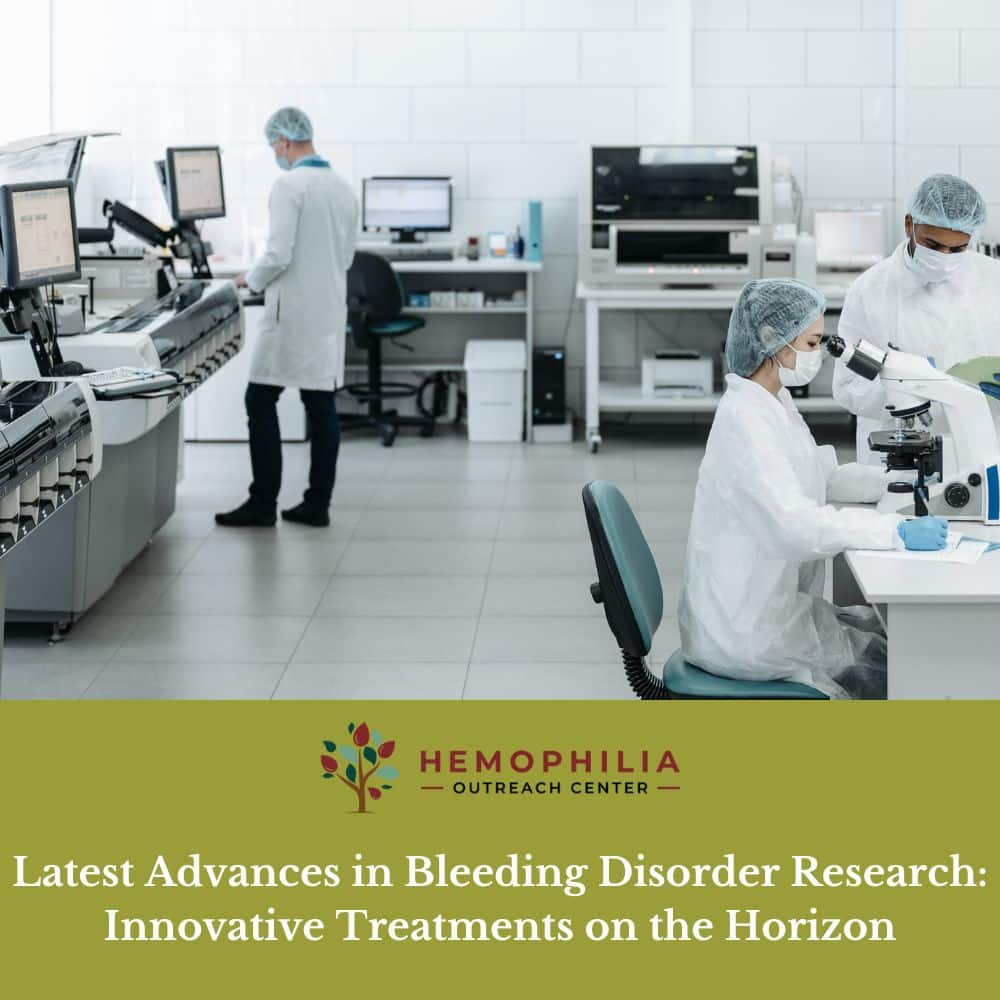Innovative Treatments on the Horizon
Bleeding disorders, which impair the body’s ability to clot blood, have long posed significant challenges for both patients and healthcare providers. Advances in bleeding disorder research are crucial for developing innovative treatments that can improve the quality of life for those affected. This article explores the latest breakthroughs and the promising therapies on the horizon.
Understanding Bleeding Disorders
Bleeding disorders are conditions that affect the blood’s ability to clot properly, leading to excessive bleeding. Common types include hemophilia, characterized by deficiencies in clotting factors VIII or IX, and von Willebrand disease, which involves a deficiency or dysfunction of von Willebrand factor. These disorders can be inherited or acquired and present with symptoms such as prolonged bleeding, frequent nosebleeds, and easy bruising.
The Evolution of Bleeding Disorder Treatment
Historically, treatments for bleeding disorders were rudimentary and often ineffective. Early methods included blood transfusions and crude clotting factor concentrates. While these treatments provided some relief, they were far from ideal and often carried significant risks.
Current Standard Treatments
Today, standard treatments for bleeding disorders have significantly advanced. Clotting factor replacement therapy is a cornerstone of treatment, involving the infusion of synthetic or plasma-derived clotting factors. Antifibrinolytics, which prevent the breakdown of clots, and desmopressin, which stimulates the release of stored clotting factors, are also commonly used.
Limitations of Current Treatments
Despite advancements, current treatments for bleeding disorders have limitations. They often require frequent administration, can cause immune-mediated responses such as inhibitors, and are associated with high costs. These challenges highlight the need for more effective and sustainable treatment options.
Breakthroughs in Gene Therapy
Gene therapy represents a groundbreaking approach in treating bleeding disorders. By introducing, removing, or altering genetic material within a patient’s cells, gene therapy aims to address the underlying cause of the disorder. Recent advancements have shown promising results, with clinical trials demonstrating sustained increases in clotting factor levels in patients with hemophilia.
Emerging Therapies and Technologies
Innovative clotting factor products, including extended half-life products and recombinant therapies, are improving treatment efficacy and reducing the frequency of infusions. Small molecule therapies are also emerging, offering new avenues for managing bleeding disorders with potentially fewer side effects.
CRISPR and Genetic Editing
CRISPR technology, a powerful tool for editing genes, holds significant promise for bleeding disorder treatment. By precisely targeting and modifying specific genes, CRISPR can potentially correct the genetic mutations causing bleeding disorders. While still in early stages, CRISPR research is advancing rapidly, though it must navigate ethical and safety considerations.
Innovative Drug Therapies
Non-replacement therapies are gaining traction as potential treatments for bleeding disorders. Bispecific antibodies, such as emicizumab for hemophilia A, mimic the action of missing clotting factors. RNA interference (RNAi) therapies, which silence specific genes involved in the disorder, are also being explored.
Regenerative Medicine and Stem Cell Research
Regenerative medicine, including stem cell therapy, offers exciting possibilities for treating bleeding disorders. By regenerating damaged tissues and potentially correcting genetic defects, stem cell research could provide long-term solutions. Current studies are exploring the viability and effectiveness of these approaches.
Personalized Medicine in Bleeding Disorders
Personalized medicine tailors treatments based on individual genetic profiles and responses. Advances in pharmacogenomics are enabling more precise and effective treatments, reducing the risk of adverse effects and improving patient outcomes.
Challenges in Bleeding Disorder Research
Research in bleeding disorders faces several challenges, including limited funding, regulatory barriers, and ethical considerations. Addressing these challenges requires sustained investment and collaborative efforts to advance scientific knowledge and develop new treatments.
The Role of Collaboration in Advancing Research
Global collaborations are essential for accelerating bleeding disorder research. Partnerships between academic institutions, pharmaceutical companies, and patient advocacy groups have led to significant breakthroughs. Successful case studies highlight the impact of these collaborations in advancing treatment options.
Patient Involvement in Research
Patient advocacy and involvement in research are crucial for developing effective treatments. Patient-centered research ensures that therapies address the real-world needs and experiences of those affected by bleeding disorders. Case studies demonstrate the benefits of involving patients in the research process.
Future Directions in Bleeding Disorder Research
The future of bleeding disorder research holds immense promise. Predicting future trends involves identifying areas needing further exploration, such as improving gene therapy techniques, developing novel drug therapies, and enhancing personalized medicine approaches.
Impact of Research on Quality of Life
Advances in bleeding disorder research are directly improving patient quality of life. Improved treatment outcomes lead to fewer bleeding episodes, reduced pain, and enhanced overall well-being, allowing patients to lead more fulfilling lives.
Frequently Asked Questions
What are the latest advancements in bleeding disorder research? Recent advancements include gene therapy, novel clotting factor products, and innovative drug therapies such as bispecific antibodies and RNA interference (RNAi) therapies.
How does gene therapy work for bleeding disorders? Gene therapy involves introducing, removing, or altering genetic material within a patient’s cells to address the underlying cause of the disorder, potentially providing long-term treatment solutions.
What is CRISPR, and how is it used in bleeding disorder research? CRISPR is a gene-editing technology that can precisely target and modify specific genes. It holds promise for correcting genetic mutations causing bleeding disorders.
Are there new treatments besides gene therapy? Yes, other innovative treatments include extended half-life clotting factor products, bispecific antibodies like emicizumab, and RNAi therapies, all of which aim to improve treatment efficacy and reduce side effects.
How does personalized medicine benefit bleeding disorder patients? Personalized medicine tailors treatments based on individual genetic profiles and responses, leading to more precise and effective therapies with fewer adverse effects.
What role do patients play in bleeding disorder research? Patients are crucial in research, providing insights into their experiences and needs, which helps in developing therapies that address real-world challenges effectively.
Conclusion
The field of bleeding disorder research is rapidly evolving, with innovative treatments offering new hope for patients. Advances in gene therapy, CRISPR, and personalized medicine are transforming the landscape of treatment, improving patient outcomes and quality of life. Continued research and collaboration are essential for overcoming existing challenges and unlocking the full potential of these groundbreaking therapies.




